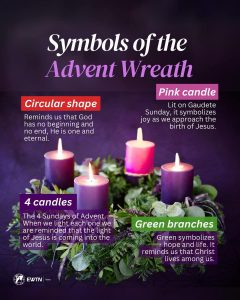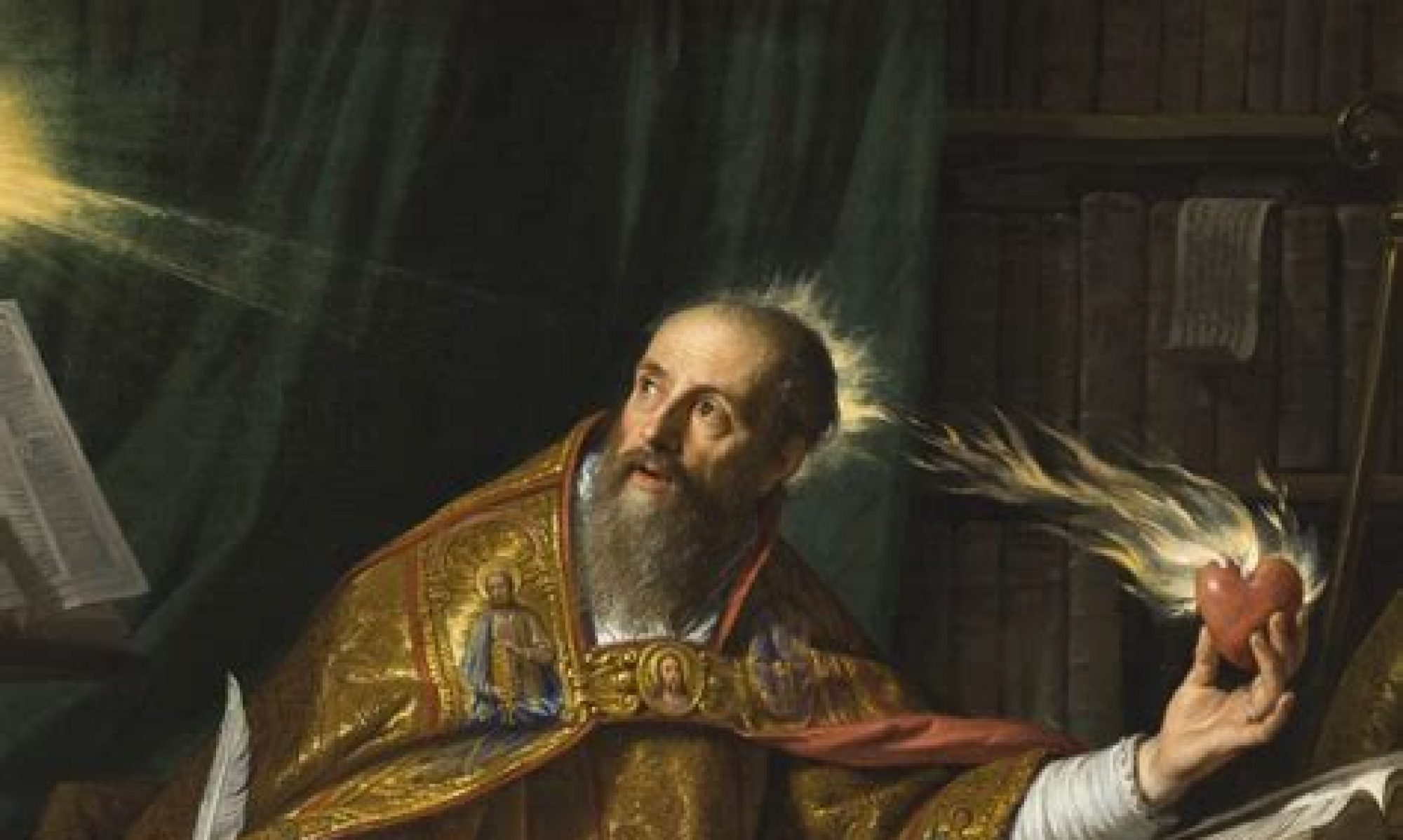Today is the 2nd Sunday of Advent, Year C. This second week of December people are preoccupied with so many things, like Christmas parties , planning for family Christmas events, and setting up Christmas decor in and outside the house. Advent is a season of joyful anticipation and waiting for the “Coming of the Lord” and our coming back to God.
We are invited to reflect on the power of God’s Word as revealed to us in the scripture. The readings for today give such hope, encouragement, joy and consolation in anticipation of His presence radiating His light, love, justice and mercy. We are confident that as we walk together as a Synodal Church, we will bring that light shining like the sun. I believe this is the wonderful gift we could bring to all we meet today.
The 1st reading is taken from the Prophet Baruch which we seldom encounter in our liturgical readings. During the period of Baruch, Jerusalem has been destroyed. The Israelites were in exile together with this messenger of God, Baruch. He was the source of inspiration for his people to not lose hope, for their beloved city has been in their hearts and spirits. It was their common hope that someday they would return to Jerusalem alive. This is their hope, that the merciful God is leading them to victory, joy and justice. Jerusalem is deeply engraved in their hearts as their genuine identity. It is this prophetic poem that reminds the chosen people that Jerusalem doesn’t speak to them as their territorial claim but as God’s manifestation of God’s greatness and glory. Their return to Jerusalem after the exile involves repentance and rebuilding a renewed relationship with God’s holy love for the redeemed.
In the 2nd reading, taken from the letter to the Philippians, St. Paul says, “I am confident of this, that the one who began a good work in you will continue to complete it until the day of Christ Jesus.” These words of St. Paul are also for us, that we must continue to seek the fruit of holiness and righteousness until Jesus comes and until the day of the Lord. We must learn to discern to do good things to each other and keep all those spiritual values that conform to God’s will. We need to seek the highest value to return back to God.
The gospel, taken from St. Luke, reminds us of the importance of the coming of the Prophet, John the Baptist, to prepare the way of the Lord, our Advent guide. St. John the Baptist is appearing in the desert to proclaim the coming of God’s salvation.
How do we appreciate the guidance of St. John the Baptist as we enter into the 2nd Sunday of Advent? What are the important messages we need to learn?
First, in life we carry in ourselves a repugnance for injustice. We are feeling distressed when we see around us the painful division that wounds us. There are times when we are affected by the severity of darkness, people losing hope to improve their lives caused by those with hardened-hearts, unmindful of the plight of the poor. This distressing image also was perceived by John the Baptist during his time. However, his holy desire to bring people back to God intensifies his given mission of preparing the people to work for justice and unity and for the coming of the Lord. He was the voice of the One Who is to come and Who will get things straight, and the valleys will become leveled.
Second, John the Baptist is preaching a baptism of repentance which is a kind of ritual purification. He addressed people to express his invitation asking them to assess their own identities, their priorities and securities. It means that he guides people to do “soul-searching” and be willing to reject their old ways and to settle for the One who is to come by offering a new manner of relating with God.
Third, John the Baptist calls for true repentance and to return to the core of our being, the abode of God’s mighty presence. We must listen attentively to the Baptist as our extra area of repentance by letting go of our anger, pride, and frustrations as part of the process of renewal in order to be saved and be conscious of His coming.
This is the very purpose of Advent that the grace to acknowledge our sins enjoys the company of God. In doing so, we are in unison with the call of what John the Baptist is prophesying, “Repent and make straight His paths, and every valley shall be filled, and every mountain and hill shall be made low. The winding roads shall be made straight, and the rough ways made smooth, and all flesh shall see the salvation of God.”
Just as we prepare for communion, we too must always prepare for the coming of Jesus through the Eucharist. With Jesus coming to us we need our own openness, lowliness of heart and simplicity of life to appreciate His great gift and grace of faith. We really need a Savior who comes with out-stretched hands to embrace us with much love.
Let us join John the Baptist for two Sundays as we prepare for Jesus’ great Coming.
Maranatha!
Fr. Arlon, osa
El Dictado del Corazón Segundo Domingo de Adviento, Año C
- Baruc 5:1-9
- Salmo 125:1-2, 2-3, 4-5, 6
- Filipenses 1:4-6, 8-11
- Lucas 3:1-6
Hoy es el Segundo Domingo de Adviento, Año C. Durante esta segunda semana de diciembre, muchas personas están ocupadas con tantas cosas, como fiestas navideñas, planes para las reuniones familiares de Navidad y decoraciones para la Misa de Navidad dentro y fuera de casa. El Adviento es un tiempo de alegre anticipación y espera por la “Venida del Señor” y nuestro retorno a Dios.
Estamos invitados a reflexionar sobre el poder de la Palabra de Dios tal como se nos revela en las Escrituras. Las lecturas de hoy ofrecen esperanza, aliento, alegría y consuelo mientras esperamos Su presencia que irradia luz, amor, justicia y misericordia. Tenemos la confianza de que, al caminar juntos como una Iglesia sinodal, llevamos esa luz que brilla como el sol. Creo que estos son los maravillosos regalos que podemos ofrecer a todos los que encontremos hoy.
La primera lectura está tomada del Profeta Baruc, un texto que rara vez encontramos en nuestras lecturas litúrgicas. Durante el período de Baruc, Jerusalén había sido destruida. Los israelitas estaban en el exilio junto con este mensajero de Dios, Baruc. Él fue una fuente de inspiración para su pueblo, animándolos a no perder la esperanza en su amada ciudad, que estaba grabada en sus corazones y espíritus. Compartían la esperanza común de regresar algún día vivos a Jerusalén. Esta esperanza se basaba en que el Dios misericordioso los estaba guiando hacia la victoria, la alegría y la justicia. Jerusalén estaba profundamente arraigada en sus corazones como su identidad genuina. Este poema profético recuerda al pueblo elegido que Jerusalén no solo habla de su reclamo territorial, sino de la manifestación de la grandeza y la gloria de Dios. Su retorno a Jerusalén después del exilio implicaba arrepentimiento y la reconstrucción de una relación renovada con el amor santo de Dios para los redimidos.
En la segunda lectura, tomada de la carta a los Filipenses, San Pablo dice: “Estoy convencido de esto: el que comenzó en ustedes la buena obra la irá llevando a buen término hasta el día de Cristo Jesús”. Estas palabras de San Pablo también son para nosotros: debemos continuar buscando los frutos de la santidad y la justicia hasta que Jesús venga y llegue el día del Señor. Debemos aprender a discernir y hacer el bien a los demás, conservando todos esos valores espirituales que se conforman a la voluntad de Dios. Necesitamos buscar el mayor valor para volver a Dios.
El Evangelio de San Lucas nos recuerda la importancia de la llegada del profeta Juan el Bautista para preparar el camino del Señor, nuestra guía en Adviento. Juan el Bautista aparece en el desierto proclamando la llegada de la salvación de Dios.
¿Cómo apreciamos la guía de San Juan el Bautista al entrar en este 2° Domingo de Adviento? ¿Cuáles son los mensajes importantes que debemos aprender?
Primero, en la vida llevamos una repugnancia hacia la injusticia. Nos sentimos angustiados cuando vemos a nuestro alrededor la dolorosa división que nos hiere. A veces, nos afecta la severidad de la oscuridad: personas que pierden la esperanza de mejorar sus vidas debido a los corazones endurecidos de otros, insensibles a las necesidades de los pobres. Esta imagen angustiante también fue percibida por Juan el Bautista en su tiempo. Sin embargo, su santo deseo de acercar al pueblo a Dios intensificó su misión de preparar a las personas para trabajar por la justicia, la unidad y la venida del Señor. Él era la voz del que venía para enderezar los caminos y nivelar los valles.
Segundo, Juan el Bautista predica un bautismo de arrepentimiento, una especie de purificación ritual. Invitó a las personas a evaluar sus propias identidades, prioridades y seguridades. Esto implica una “búsqueda del alma”, estar dispuestos a rechazar las viejas maneras de vivir y abrirse al que ha de venir, ofreciendo una nueva forma de relacionarse con Dios.
Tercero, Juan el Bautista llama al verdadero arrepentimiento y al retorno al núcleo de nuestro ser, el lugar donde habita la poderosa presencia de Dios. Debemos escuchar atentamente al Bautista y tomar esto como un área adicional de arrepentimiento, dejando ir nuestra ira, orgullo y frustraciones como parte del proceso de renovación para ser salvados y conscientes de Su venida.
Este es el propósito del Adviento: que la gracia de reconocer nuestros pecados nos lleve a disfrutar de la compañía de Dios. Al hacerlo, estamos en sintonía con el llamado que profetiza Juan el Bautista: “Arrepiéntanse y enderecen sus caminos. Todo valle será rellenado, toda montaña y colina serán aplanadas; lo torcido será enderezado, y los caminos ásperos serán allanados, y todos verán la salvación de Dios”.
Así como nos preparamos para la comunión, también debemos prepararnos siempre para la venida de Jesús a través de la Eucaristía. Jesús viene a nosotros, y necesitamos apertura, humildad y sencillez de corazón para apreciar Su gran regalo y la gracia de la fe. Realmente necesitamos un Salvador que venga con brazos extendidos para abrazarnos con mucho amor.
Unámonos a Juan el Bautista durante estos dos domingos mientras nos preparamos para la gran venida de Jesús.
¡Maranatha!
P. Arlon, osa

